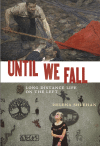
Until We Fall: Long Distance Life on the Left
Offers vivid first hand accounts of encounters with fellow socialists following the fall of the Soviet Union
Most westerners glimpsed the breakup of the Soviet Union at a great distance, through a highly distorted lens which equated the expansion of capitalism with the rise of global democracy. But there were those, like Helena Sheehan, who watched more keenly and saw a world turning upside down. In her new autobiographical history from below, Until We Fall, Sheehan shares what she witnessed first-hand and close-up, as hopes were raised by glasnost and perestroika, only to be swept away in the bitter and brutal counterrevolutions that followed.
In Until We

July-August 2023 (Volume 75, Number 3)
Writing at the end of the nineteenth century, Frederick Engels foresaw that without disarmament, Europe would soon be plunged into war. Modern weaponry has made the question of disarmament even more urgent. In this month’s “Notes from the Editors,” the editors put forward the objectives for a contemporary socialist disarmament strategy. | more…
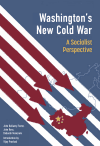
Washington’s New Cold War: A Socialist Perspective
As the American people delude themselves once more into thinking of the United States as a liberating force for peace in the world, Waging a New Cold War invites us, instead, to think for ourselves. Behind the scenes the plans to wage war have been laid—either by proxy, as in Ukraine, or directly, against the U.S.’s old twentieth-century foes. Waging a New Cold War: A Socialist Perspective makes a strong case that, as the official story is laid out by government propagandists, and as the mainstream media provides cover, the aim of this latest set of American military escapades remains the same as ever: Maintenance of U.S hegemony in the global financial system. Foregrounded with an introduction by Vijay Prashad, this cogent collaboration puts forth three essays that illustrate clearly that, while the Cold War against the Soviet Union ended, the “cold war” against the “enemies” of the United States did not. Furthermore, its authors lay out evidence that the U.S. establishment has been willing to risk nuclear winter—in other words, mutual annihilation—to hold onto economic primacy. And they show that, while Russia and China can each be criticized, justifiably, for their violations of human life and dignity, neither, on its own, threatens the eruption of a Third World War and the end of the human race as we know it. Just in time, we have in our hands an intelligent text that strengthens our struggle against the cynical machinations of the American military behemoth and its propaganda machine. | more…

End of Cold War Illusions
In this reprint of the February 1994 “Notes from the Editors,” former MR editors Harry Magdoff and Paul M. Sweezy ask: “The United States could not have won a more decisive victory in the Cold War. Why, then, does it continue to act as though the Cold War is still on?” | more…
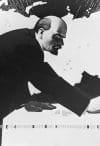
Some Lessons on Planning for the Twenty-First Century from the World’s First Socialist Economy
The Soviet Union’s efforts at centralized economic planning suffered greatly by neglecting to integrate cybernetics into a comprehensive model. Today, this cybernetic approach to economic planning is still blocked. The time has come to implement alternative planning in the form of an automated model that coordinates the activities of all industries and sectors of toward a prosperous and sustainable future. | more…

A New Environmental History of Socialist States
Recent scholarship suggests that the widespread perception of Soviet states as uniquely ecologically disastrous is, at best, exaggerated, and that these environmental legacies must be re-examined. | more…
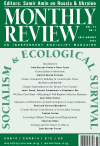
July-August 2022 (Volume 74, Number 3)
Between 1949 and 1980, over a hundred articles in Monthly Review dealt with the Soviet Union directly, with many more addressing it indirectly. But, after 1993, treatments of post-Soviet Russia in the magazine largely ceased. | more…

Radek: A Novel
Through this dramatic history by Stefan Heym, we become intimate with the story of the maverick and internationalist Karl Radek, known as the editor of the newspaper of record throughout the Soviet era, Isvestia. Beginning as Lenin’s companion at the dawning of the October Revolution, Radek later became Stalin’s favorite intellectual – only to find himself entangled in the great purges of the late 1930s and scripting his own trial. In this, his last historical novel, Heym reveals Radek as a brilliant Bolshevik journalist and politician who found himself at every turn of the wheel of fate. | more…
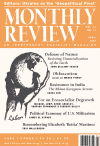
April 2022 (Volume 73, Number 11)
As we write these notes at the beginning of March 2022, the eight-year limited civil war in Ukraine has turned into a full-scale war. This represents a turning point in the New Cold War and a great human tragedy. By threatening global nuclear holocaust, these events are also now endangering the entire world. To understand the origins of the New Cold War and the onset of the current Russian entry into the Ukrainian civil war, it is necessary to go back to decisions associated with the creation of the New World Order made in Washington when the previous Cold War ended in 1991. | more…

Crisis of Socialism and Effects of Capitalist Restoration
The main criticism leveled at the socialist economies was that a planned economy was inherently less efficient than a market one, due to the sheer scale of the bureaucratic task involved with planning a major economy. But the collapse of the Soviet and later the Russian economy under Mikhail Gorbachev and then Boris Yeltsin was an economic disaster that was otherwise unprecedented during times of peace. The world’s second superpower was reduced to the status of a minor bankrupt economy with a huge decline in industrial production and in living standards. | more…

Evald Ilyenkov and Soviet Philosophy
Vesa Oittinen interviews Andrey Maidansky about Soviet philosophy and the well-known and controversial Soviet philosopher Evald Ilyenkov (1924–79). | more…

On the Coincidence of Logic with Dialectics and the Theory of Knowledge of Materialism
In this reprint of “On the Coincidence of Logic with Dialectics and the Theory of Knowledge of Materialism,” Evald Ilyenkov discusses the idea of the coincidence of dialectics, logics, and theory of knowledge—one of the hallmarks of the Ilyenkovian current in post-Stalin Soviet philosophy. Ilyenkov was a renowned and controversial Soviet Marxist philosopher who contributed substantially to the Marx Renaissance that emerged in the so-called Thaw Period, aiming to reconstruct Marx’s original methodology. He was known as an ardent critic of technocratic tendencies in the Soviet Union and stressed that socialist society should express humanist values and not merely be an engineering project. | more…